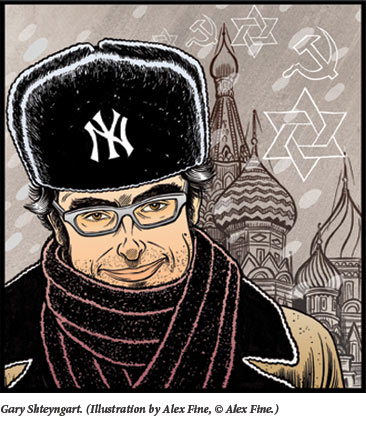Words, Words, Words
As its mouthful-of-a-title suggests, Super Sad True Love Story is a super-ambitious book. But super may be the only part of the title that pans out in Gary Shteyngart’s novel about a nightmarish near-future America overrun by consumerism and obsessed with youth. In Shteyngart’s dystopian satire, America is at war with Venezuela and economically dependent on China—which is threatening to pull away—and the general public is at the mercy of a constantly streaming information and sensory overload that renders both privacy and books virtually obsolete.
At the center of the novel is the tragic figure of 39-year-old Lenny Abramov, the earnest, intelligent, rather awkward and unattractive son of Russian-Jewish immigrants who sells “indefinite life extensions,” and who, having fallen in love with a 24-year-old Korean-American beauty named Eunice Park, is determined to live forever. The couple’s doomed romance is unconvincing from the start, at least in part because Lenny and Eunice are stock characters. He’s the needy, nerdy Jew-boy; she’s the beautiful, opportunistic and hypersexual Asian woman. (It is perhaps worth noting—or at any rate, Shteyngart expects us to note—that the author is the son of Russian-Jewish immigrants, and his wife is Korean-American.)
 In a world where books are archaic and widely believed to smell bad, Lenny persists in reading (Chekhov and Tolstoy are among his favorites), as Eunice is “freaked . . . out” to observe. As if reading weren’t bad enough, Lenny also keeps a diary, which constitutes half of the narration of this novel. The other half comes in the form of Eunice’s online correspondence. Eunice is a prototypical twenty-something in this hyper-digitized world, where “apparati”—futuristic iPhones—give people access to each other’s credit and sexual desirability ratings, among other things, and her messages are a pastiche of internet slang and vulgarities, and talk of clothes.
In a world where books are archaic and widely believed to smell bad, Lenny persists in reading (Chekhov and Tolstoy are among his favorites), as Eunice is “freaked . . . out” to observe. As if reading weren’t bad enough, Lenny also keeps a diary, which constitutes half of the narration of this novel. The other half comes in the form of Eunice’s online correspondence. Eunice is a prototypical twenty-something in this hyper-digitized world, where “apparati”—futuristic iPhones—give people access to each other’s credit and sexual desirability ratings, among other things, and her messages are a pastiche of internet slang and vulgarities, and talk of clothes.
It’s not that Lenny is entirely impervious to his surroundings; but he is more than just a product of his environment. Thus, while everyone in the world of this novel lusts after youth, Lenny’s lament seems more heartfelt: “Oh, dear diary. My youth has passed, but the wisdom of age hardly beckons. Why is it so hard to be a grown-up man in this world?” As for Eunice, while she is occasionally introspective, her conversational style is inevitably trite. Of Lenny she notes that, despite having promised her that he would read less, he is “all caught up in these texts. I looked up War and Peace and it’s about this guy Pierre who fights in France, and all this terrible stuff happens to him, but in the end because of his charm he gets to be with this girl he really loves, and who really loves him even though she cheated on him.” That, she says, is “Lenny’s view on life in a nutshell, that in the end niceness and smartness always win.”
This relationship waxes, then wanes, against the backdrop of Shteyngart’s America, where the Bipartisan Party is the only political option; television has been reduced to all of two channels, Fox Liberty-Prime and Fox Liberty-Ultra, and The New York Times has been replaced by The New York Lifestyle Times. The Lifestyle Times is still “more text heavy than other sites” with “half-screen length essays on certain products sometimes offering subtle analysis of the greater world.” Individuals are ranked according to their financial worth and physical robustness, with those at the very bottom of the hierarchy labeled “Impossible to Preserve.”
Shteyngart’s depiction of what our increasingly technology-dependent world is coming to, as people become more comfortable tweeting than talking, is telling. But too often the novel goes over the top in its parody, so that at times it closely resembles the very object of its derision. This begins with the book’s box-like jacket, which includes a description of the package’s contents: “a printed media artifact formerly known as a BOOK” and a warning: “Reed at our own risk! Harvard Fashion School studies has been shown that reeding long-form texts can dicrease shopping/consupmtioning abilities and cause eye strain problemz and unattractiveness in girlz aged 3 to 90.”
Even more bizarre is a trailer produced for the novel in which Shteyngart plays an illiterate version of himself, an up-and-coming Russian-American author who has just published his third novel—this one—to critical acclaim, despite the fact that he cannot read. It might have been a clever marketing ploy (indeed, the YouTube video has over 150,000 hits), but the Borat-inspired humor is cringeworthy. In one scene, his student (Shteyngart teaches at Columbia University) says that her favorite class was a seminar titled, “How to behave at a Paris Review Party,” and the video shifts to Shteyngart in action, swirling a glass of wine as he demonstrates in a heavily accented drawl: “I do so much prefer early Ian McEwan to late Ian McEwan, ahem, ahem.”
Although it does raise real questions about our collective future, Shteyngart’s novel doesn’t raise itself very far above such promotional clowning. Lenny, in particular, is an all-too-familiar character: the Ashkenazic anti-hero, a pseudo-intellectual hopelessly out of touch with his environs, a loser, in short. We’ve met him before in Roth and Bellow, and onscreen in Woody Allen films. More recently, he’s made an appearance in Sam Lipsyte’s novel The Ask. Like Shteyngart, Lipsyte is a rising star on the American literary scene; for both, Jewishness is more incidental than central, although it is very much present in their characters’ lives and consciousness. But Lipsyte’s loser is a more sympathetic character than Lenny, if only because The Ask is a less grandiose novel than Super Sad, with room for a character to grow and develop. In Shteyngart’s novel, character comes off as just another gimmick, as does Jewishness and immigrant identity.
This is a pity because Shteyngart is, perhaps in spite of himself, a good writer and there are beautiful sentences lurking about, as when Lenny observes of Eunice’s mother that there was “a great spidery web of defeat spread across her face.” He can also display a sly sense of humor, as when we learn that the New York City transit system is “run on a for-profit basis by a bunch of ARA (American Restoration Authority)—friendly corporations under the slogan ‘Together We’ll go Somewhere.'” But more often than not the humor gets lost in the noise of exaggeration.
In the end, Shteyngart leaves us less afraid of the impending demise of books than alarmed at the narcissistic collection of jokes and tricks that are being passed off here as a serious work of literature. When Lenny decides, toward the end of the novel, that he is going to give up on immortality and die after all, he remarks that all that will remain will be his data, “Words, words, words.” In a sense, of course, words are all that remain of any work of literature—even Lenny’s beloved Chekhov—but in Shteyngart’s case, one sometimes feels as if that’s all there is to the novel.
As Super Sad True Love Story draws to a close, we discover that much of what we’ve read is a book within a book: Lenny’s diary entries and Eunice’s online correspondences have been published and released in New York and Hong Kong. When Lenny encounters an actress who has been cast as Eunice in a theatrical adaptation, he finds himself compelled to propose a final, gruesome scenario, in which both he and Eunice die. The actress and her friends are shocked into silence, and with the book’s final sentence the reader finally identifies with Lenny, who is blessed with what he “needed the most. Their silence, black and complete.”
Suggested Reading

High Fives
The JRB editors celebrate our fifth anniversary with our top-five book lists.
Letters, Fall 2021
We and I; It's a Novel: An Exchange

Denial and the Defense of Truth
Denial is more than a slick courtroom drama about Holocaust denial; it is also a defense of objective truth against nihilistic relativism, a call to arms by the establishment against self-proclaimed outsiders who deny all sorts of truths.
Scaling the Internet
September 11, 2001 proved Akamai's technology could withstand anything. Cruelly, inventor Danny Lewin was the first to die in the attacks.
Comments
You must log in to comment Log In